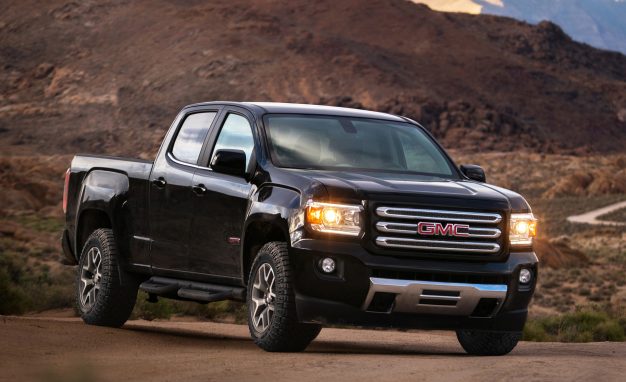I am from truck country, USA. I’m of course talking about the Lone Star State of Texas. Living in Texas, you see all kinds of trucks driven by all kinds of people, and bigger is definitely better. That’s not a problem with all that open space, big and plentiful parking lots, good roads, and large highways.
The Canyon nameplate returned to the GMC lineup for the 2015 model year, and for 2017, the truck got the Denali treatment. Before we get to the fancy-pants options in this luxo-truck, how do the dimensions compare to its full-size big brother, the Sierra? When comparing the longest models of the two (crew cab with the long bed), the Canyon is 224.6 inches, about 14 inches shorter than the longest Sierra that measures 224.6. Measuring in at 80 inches, the Sierra is roughly 6 inches wider than the Canyon’s 74.3 inches of width. The tallest Sierra is 3.5 inches higher than the tallest Canyon—that height is not usually a big concern unless you’re parking in a garage with a low clearance.
The 2017 GMC Canyon Denali came loaded with many standard features including 20-inch alloy wheels, an 8.0-inch touchscreen with navigation and Intellilink, OnStar with a 4G LTE Wi-Fi hot spot, heated and ventilated front leather seats, a heated leather wrapped steering wheel, wireless cell phone charging, chrome running boards, easy-lift tailgate, a spray-on bed liner, four-wheel drive, a locking rear differential, and lots of exterior chrome trim. The only option our tester has is the $495 Red Quartz Tintcoat exterior color, This came out to a grand total of $44,255. For reference, that is about the same as a well-equipped, rear-wheel-drive GMC Sierra crew cab with the 5.3-liter V-8. If size doesn’t matter in your area, the full-size Sierra might be the better value option.
Around town, the Canyon Denali provided a surprisingly quiet, comfortable ride with quick acceleration. Handling is nice and nimble at low and highway speeds and steering weight is just right for a truck. The brakes feel a little soft but provide strong stopping power. At 70 mph, the V-6 hums along at a quiet 1,750 rpm, great for fuel economy, especially when cylinder deactivation kicks it. However, give the engine some throttle, and the eight-speed is reluctant to downshift much at highway speeds unless you completely floor it.
Living in Texas, I never really understood why some people like small trucks. Trucks are meant to be big and powerful. After living in a dense metropolitan area, however, I now understand why. Even if you don’t live in a big city, Canyon-sized pickup trucks are great for anyone who wants truck capability but not the large size and the extra expense that accompanies owning a full-size truck.


